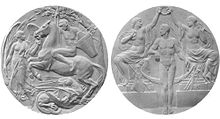| 1908 Summer Olympics medals | |
|---|---|
| Location | London, |
| Highlights | |
| Most gold medals | |
| Most total medals | |
| Medalling NOCs | 19 |

The 1908 Summer Olympics (also known as the Games of the IV Olympiad) was an international multi-sport event held from 27 April to 31 October 1908, in London, United Kingdom, coinciding with the Franco-British Exhibition.
Contents
A total of 2,008 athletes representing 22 nations participated in 110 events in 18 sports. Diving, field hockey, and figure skating were contested for the first time at these Games. [1] Argentina, Switzerland and Turkey were the only nations that did not earn any medals. [2]
The host nation, the United Kingdom, with by far the most competitors, dominated the medal table, collecting the most gold (56), silver (51), and bronze (39) medals. [2] The 146 medals won at these Games—a major increase from the two medals won at the 1904 Summer Olympics in St. Louis—are still the highest number won by a British delegation at any modern Olympics. [3] Particular success was achieved by the British team in the boxing events, where out of a possible fifteen medals across the five weight classes, they won all but the middleweight silver medal, which was taken by Reginald Baker competing for Australasia. The United States finished second in the medal standings, and Sweden third.
Australasia was the name given to the combined team of athletes from Australia (making its fourth Olympic appearance) and New Zealand (competing for the first time). The host team included a number of athletes from Ireland, at the time part of the United Kingdom. In contrast, Finland, which was integrated in the Russian Empire, competed in London as a separate country. [4]

